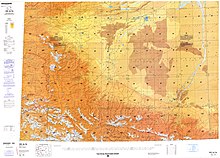Citations:Yopurga
Jump to navigation
Jump to search
English citations of Yopurga

- 1986 January 24 [1985 August 15], “Reform of Minority Nationality Education Discussed”, in China Report, Political, Sociological and Military Affairs[1], Foreign Broadcast Information Service, pages 109–110:
- In Yopurga County, the enrollment and consolidation rates for school-age children are 98 percent, while the rate for the elimination of illiteracy in the 12-to-40 age group exceeds 96 percent. The county has been certified by the People's Autonomous Region Government as Xinjiang’s best county at universalizing elementary education and eliminating illiteracy. Yopurga is one of Xinjiang's poor counties, but it nevertheless jumped to the top in those two areas.
- 1987, T. Hoppe, edited by Bernhard Glaeser, Learning from China? Development and Environment in Third World Countries[2], Allen & Unwin, →ISBN, →LCCN, →OCLC, page 63:
- The Yopurga district [southeast of Kaxgar] had a grain surplus from the fifties up to the sixties; it was able to transfer 5 to 6 million jin and often as much as 7 million jin of cereals [2,500—3,500 tonnes] to other places. The arable land of the whole district is now completely salinized. Since 1970, this grain surplus district has become a grain deficit district (Chen Hua, 1983b, p. 3).
- 2017 May 15, “China: Police DNA Database Threatens Privacy”, in Human Rights Watch[3], archived from the original on 16 May 2017[4]:
- In 2016, the Xinjiang PSB also issued a “Notice to Fully Carry Out the Construction of Three-Dimensional Portraits, Voiceprint and DNA Fingerprint Biometrics Collection System” (关于全面开展三维人像、声纹、DNA指纹生物信息采集系统建设相关工作的通知). But the full document is not publicly available. It is unclear who is targeted for such collection; how this information is to be used, shared, or stored; the rationale behind the collecting; or how one challenges the collection. A separate call for tender issued by the Yopurga County Police Bureau, Kashgar, Xinjiang, cited the “notice” and stated that the biometric collection is part of “stability maintenance.” Regional authorities have revealed little about these new efforts.
- 2019 January 6, “Across China: Potato planting turns desert into land of fortune”, in mmm, editor, Xinhua News Agency[5], archived from the original on 6 January 2019[6]:
- Zhu is an official at the commerce department of Xinjiang Uygur Autonomous Region. A year ago, she was tasked with assisting the poverty alleviation work in a village under Yopurga County, some 1,500 km away from the regional capital of Urumqi.
Yopurga is located at the western edge of the Taklimakan, the largest desert in China, and local farmers used to grow wheat, cotton and dates.